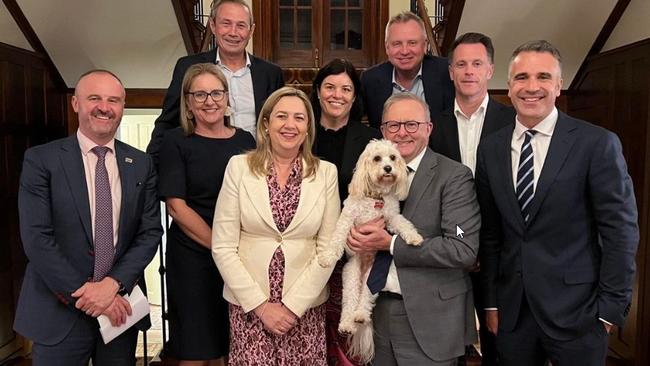Editorial: National cabinet a problem solver
The most surprising thing about this week’s national cabinet was that everyone walked away happy, writes the editor.

Opinion
Don't miss out on the headlines from Opinion. Followed categories will be added to My News.
The most surprising thing about Wednesday’s national cabinet meeting – the regular gathering of the prime minister, state premiers and chief ministers in Canberra – was that everyone walked away happy.
That’s not always the case when the states and the Commonwealth sit down to discuss who does what and how to pay for it, especially when the topic is a big and as expensive as the National Disability Insurance Scheme.
Everyone accepts the NDIS is a good idea, created in 2013 and rolled out nationally only three years ago, but already providing support for more than half-a-million adults and children, many of whom are receiving help for the first time.
But most also accept the scheme’s costs can’t keep growing the way they have been – to an estimated $50bn next year more than $90bn within a decade – unless there are big changes, which was the big topic at this week’s national cabinet meeting.
Cabinet members agreed the states and territories would assume more responsibility for helping children with mild autism and other developmental challenges – currently one of the fastest growing areas of demand for NDIS services. In return, the federal government would increase hospital funding and maintain the higher levels of GST payments previously agreed to by the Morrison government.
None of this solves the overall funding and operational issues of the NDIS, which are addressed in a major review of the scheme, which has just been released.
But what the new deal does suggest is that, almost by accident, our state and federal governments might finally have found a sensible and productive way to negotiate with each other.
The eternal challenge for the Australia federation model is that although the states provide most of the services, the Commonwealth raises most of the money.
Carving up the pie in some vaguely fair way has always been a challenge and, over the years, has led to some big fights not only with the federal government but also between the states.
But now, on the evidence of this week’s national cabinet model, we seem to have stumbled across a workable system, capable of delivering unanimously agreed-to outcomes.
This is all the more remarkable given that national cabinet first met in March 2020 as an emergency response to the then-rapidly emerging Covid pandemic rather than as the product of a considered examination of how to improve federal/state collaboration.
All everyone could agree to at the time was that the existing 30-year-old mechanism – the Council of Australian Governments – had grown so bureaucratic and bulky and process-driven it couldn’t make decisions at the speed necessary to confront the pandemic.
Or as then prime minister Scott Morrison put it, COAG had become a place where good ideas went to die.
We’re sure national cabinet members won’t always agree and the states will regularly complain of unfair treatment – recent cuts to infrastructure spring to mind.
But anything that puts our state and federal leaders together in a room every month or so to nut out the answers to our common challenges can’t be a bad thing.
VULNERABLE CAN’T WAIT ANY LONGER
The revelation that 114 new specialist domestic violence officers have not been hired
yet – despite being budgeted for – calls into question this state’s commitment to ending the DV scourge.
A year ago, a damning inquiry into Queensland Police’s handling of DV cases in this state recommended that the number of cops in the vulnerable persons unit be increased.
But that hasn’t happened and it might not for another two years.
Police are also yet to launch vulnerable persons units in five police districts, which was
another key recommendation during the inquiry.
While the deadline is not for another five months, the average Queenslander would have expected some progress to have been made, particularly as the funding is there.
Police Minister Mark Ryan has said as much, telling The Courier-Mail it is a matter for the QPS and the Police Commissioner.
But it is also his job to ensure the funding is being used.
This state has had more than its share of DV tragedies, including the deaths of Hannah Clarke and her three children.
There is now a higher community expectation that police will take DV matters seriously.
And most officers do.
But their hands are tied if they don’t have the resources to do it properly.
The money is there to be spent, and this needs to be made a priority.
Responsibility for election comment is taken by Chris Jones, corner of Mayne Rd & Campbell St, Bowen Hills, Qld 4006. Printed and published by NEWSQUEENSLAND (ACN 009 661 778). Contact details here


